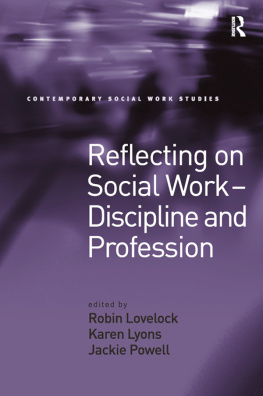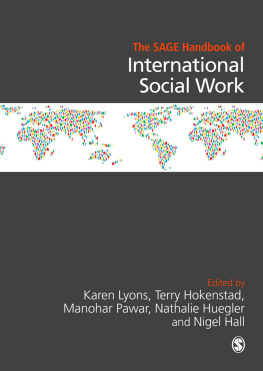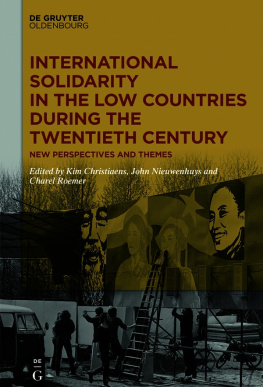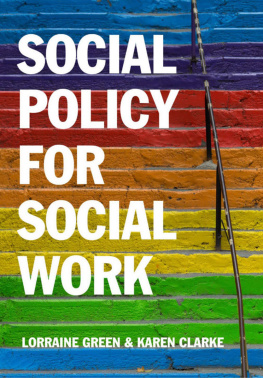International Social Work
International Social Work
Themes and Perspectives
Karen Lyons
To Paul, Kevin and Claire - you have provided stimulus and support (and sometimes distractions!) throughout my working life, not least in the endeavours which have resulted in this book. Thank you.
First published 1999 by Ashgate Publishing
Published 2016 by Routledge
2 Park Square, Milton Park, Abingdon, Oxon OX14 4RN
711 Third Avenue, New York, NY 10017, USA
Routledge is an imprint of the Taylor & Francis Group, an informa business
Copyright Karen Lyons 1999
All rights reserved. No part of this book may be reprinted or reproduced or utilised in any form or by any electronic, mechanical, or other means, now known or hereafter invented, including photocopying and recording, or in any information storage or retrieval system, without permission in writing from the publishers.
Notice:
Product or corporate names may be trademarks or registered trademarks, and are used only for identification and explanation without intent to infringe.
International social work: themes and perspectives
1. Social service
I. Title
361.3'2
Library of Congress Cataloging-in-Publication Data Lyons,
Lyons, K. H. (Karen Hamilton), 1944
Intemational social work: themes and perspectives / Karen Lyons,
p. cm.
Includes bibliographical references.
ISBN 978-1-85742-389-1
1. Social service-Cross-cultural studies. 2. Social serviceinternational cooperation. 3. International agencies. I. Title. HV41.L98 1998
361.2'6-dc21
98-35470
CIP
ISBN: 978-1-31525-193-6 (ebk)
ISBN: 978-1-85742-389-1 (hbk)
CONTENTS
Preface
From my earliest studies in geography and involvement as an undergraduate in international workcamps and a World Student Christian Federation conference, I have been fascinated by the commonalities and diversity in the human condition, and by the responses to issues which confront individual societies and cross national borders. An early choice to pursue qualifications in social welfare and then social work rather than international relations rooted me in the UK, and in fact in the East End of London.
A family tradition of migration gave me some feeling for the impact of population mobility on individuals and groups, which was heightened by my initial professional experience in school social work and by links with others in that field in Europe and the US. As an academic in the 1980s, I was involved in curriculum developments relating both to the recog nition of racism and other forms of discrimination in the UK (and acutely felt in East London) and to the increasing regionalisation being brought about by European policies and impacting on higher education through exchange schemes.
It was the bringing together of these two strands which motivated the establishment in the early 1990s of a one-year programme about international social work. As part of this programme, students undertake a three-month project outside the UK, in a country and on a topic of their own choosing. The course not only required me to develop specific teaching material but has also resulted in the presentation by students of a wealth of comparative data and perspectives on welfare systems, social work and their experiences (as temporary outsiders) across a range of societies.
Meanwhile, periodic opportunities to participate, in various capacities, in national, regional and international activities have enabled me to establish professional relationships with others in the field and in academic work across five continents. Many colleagues have been similarly engaged in the development of regional and international exchange, knowledge, policies and practice while others have enriched my understanding of more local problems and approaches.
My debts therefore are many and diffuse (in time and space) and the singling out of individuals for thanks would be invidious. Periodic intentions to undertake a systematic analysis of the (boxes of) notes accumulated from my own travels and later of student assignments, which might have resulted in individual acknowledgements, have proved quite impractical! In any case recent years have seen a growth in literature which is central or adjacent to the themes of this book, some of which is formally referenced in the pages which follow. Additionally, in an age of mass communications, information about changing concerns and events is disseminated by items in the press, media and Internet, not to mention official reports and agency literature.
This book represents, therefore, the bringing together from many sources of ideas about issues which I think are pertinent to the development of international social work, and aims to encourage the greater recognition of globalisation as relevant to the concerns and work of social professionals in myriad roles and places. I have avoided use of the word millennium in this text but clearly there are significant uncertainties for many in the world at this time, which, however, will not be resolved by the passing from one century to another (according to the Western calendar). The challenges to social professionals involved in researching, designing and implementing welfare programmes, in demonstrating the way economic, political and technological decisions impact on vulnerable people and in educating others, for these tasks will continue to be considerable. I believe that increased understanding of global forces and opportunities for international exchange and action will assist in these processes.
In conclusion then, I acknowledge the incalculable contribution of past and present students at the University of East London and of the many colleagues at home and abroad, who have consciously or unwittingly informed my thinking and influenced my perceptions about comparative and international social work. At a more prosaic level, thanks are due to Kevin Lyons for technical assistance with the production of this text from one who has recognised the need for social professionals to be IT literate but who is still learning in this field - as in many others!
Karen Lyons London, June 1998
Introduction: defining the area
This book aims to advance ideas about the nature of international social work and to provide theoretical and illustrative material as a basis for developing its practice. It argues that even an activity apparently so intimately linked to the socio-economic characteristics and culture (or cultures) of a given country must recognise the impact of globalisation and of regional policies on the welfare of citizens in diverse societies. Additionally, there is a place for social work activity which is more explicitly crossnational or international in its form. While leaders in the field have historically been aware of social work developments elsewhere and have often been active at an international level, recent rapid globalisation has impacted on social welfare as much as on other aspects of daily life, and now requires all social workers to place their local activities in a wider frame, or, in some cases, to operate outside or across political boundaries.
This opening chapter examines some of the concepts and contextual factors which underpin the development of international social work, and reviews briefly some of the commonalities and international aspects of the historical origins of social work, before discussing the purpose and nature of social work as a local and global profession. The concluding section summarises the rationale for internationalising social work and outlines the content of the remaining chapters.











